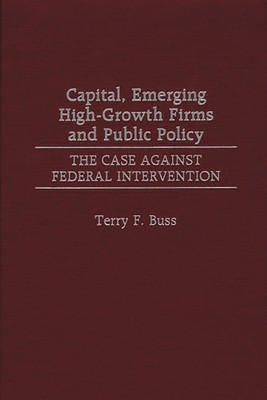
- We will send in 10–14 business days.
- Author: Terry F Buss
- Publisher: Praeger
- ISBN-10: 027596860X
- ISBN-13: 9780275968601
- Format: 16.4 x 24.2 x 2.5 cm, hardcover
- Language: English
- SAVE -10% with code: EXTRA
Capital, Emerging High-Growth Firms and Public Policy (e-book) (used book) | bookbook.eu
Reviews
Description
Policy makers--Republican and Democrat, liberal and conservative--call for federal intervention to fund emerging high-growth industries, believing they are starved for capital. Congressional hearings, newspapers, industry newsletters, and government reports all assert that capital gaps exist for these firms. But the widely held belief that emerging high-growth firms like those in high technology--so vital to the growth of the U.S. economy--face severe capital gaps, preventing them from starting up or growing to their full potential, is false. This book systematically brings together, for the first time, disparate sources of information from a wide variety of disciplines and synthesizes them into a compelling case against federal intervention.
Scientific studies, conventional wisdom among entrepreneurs and investors, and economic reasoning all fail to support the existence of widespread capital gaps for start-up high-growth firms. Nor does this evidence show capital in short supply in some regions, in industrial sectors including high technology, or for women and minorities. Nor do existing federal programs providing capital to emerging high-growth businesses reveal capital gaps. Rather, they either unnecessarily duplicate private investment or represent poor investment decisions. This study shows that calls for increased federal intervention, using public monies to plug capital gaps, are unjustified.
EXTRA 10 % discount with code: EXTRA
The promotion ends in 20d.02:59:25
The discount code is valid when purchasing from 10 €. Discounts do not stack.
- Author: Terry F Buss
- Publisher: Praeger
- ISBN-10: 027596860X
- ISBN-13: 9780275968601
- Format: 16.4 x 24.2 x 2.5 cm, hardcover
- Language: English English
Policy makers--Republican and Democrat, liberal and conservative--call for federal intervention to fund emerging high-growth industries, believing they are starved for capital. Congressional hearings, newspapers, industry newsletters, and government reports all assert that capital gaps exist for these firms. But the widely held belief that emerging high-growth firms like those in high technology--so vital to the growth of the U.S. economy--face severe capital gaps, preventing them from starting up or growing to their full potential, is false. This book systematically brings together, for the first time, disparate sources of information from a wide variety of disciplines and synthesizes them into a compelling case against federal intervention.
Scientific studies, conventional wisdom among entrepreneurs and investors, and economic reasoning all fail to support the existence of widespread capital gaps for start-up high-growth firms. Nor does this evidence show capital in short supply in some regions, in industrial sectors including high technology, or for women and minorities. Nor do existing federal programs providing capital to emerging high-growth businesses reveal capital gaps. Rather, they either unnecessarily duplicate private investment or represent poor investment decisions. This study shows that calls for increased federal intervention, using public monies to plug capital gaps, are unjustified.


Reviews